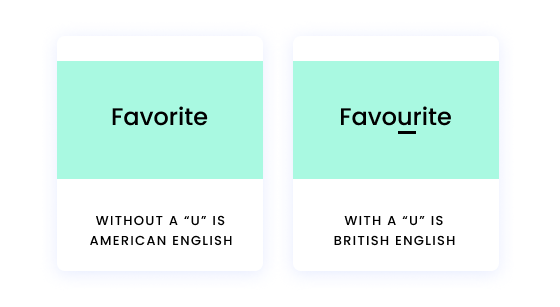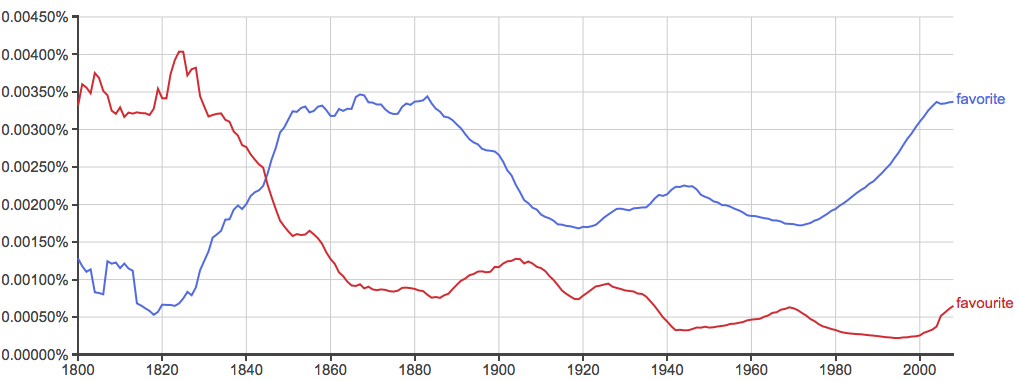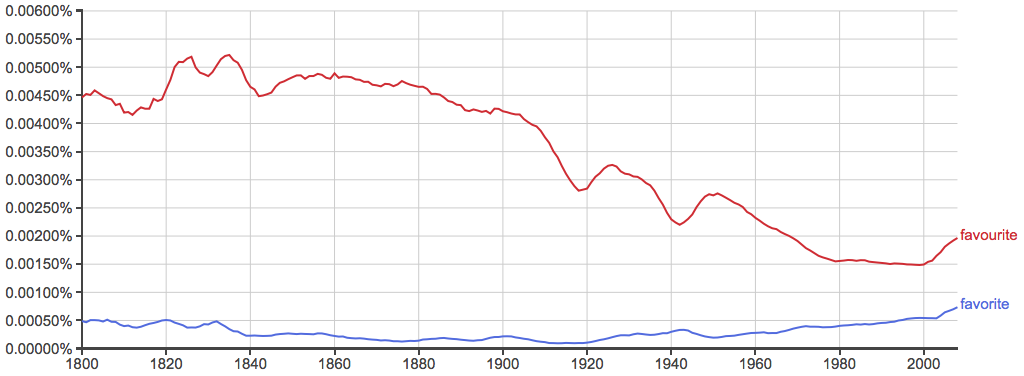A client recently asked me if I could write for a British audience. She quipped, “I’ve seen you use favourite around social, so I thought you’re familiar with the spellings used in the U.K.”
Her observation was, of course, on point. I was, in fact, using the British spelling of favourite. But what I didn’t realize was whether I was using it correctly. As mortifying as it is to admit, I was just using the -our version of the word because it seemed right.
Then came another realization: I had to revise my spellings across the board. And, here I am, dear reader — sharpening my digital pencil to clarify what’s right, favorite vs. favourite, in the divided world of English language.
Let’s hit it.
What’s the correct way to spell favorite?
First things first, both favorite and favourite are correct spellings. The version that’s correct for you, however, depends on where you live and who you’re writing for — same goes for canceled vs. cancelled.
Primarily, you need to remember:
This latter version with a “u” is also the spelling that’s largely preferred in other countries that favor British English, including Canada, Australia, and New Zealand.
That said, the spelling difference is applicable on all relatives of the word, including favorites, favorited, and favoritism in the US and favourites, favourited, and favouritism in the UK and other countries.
Here are example sentences using favorite and favor:
• My favorite ice cream flavor is chocolate chip.
• Her favorite son wore a navy blue suit with a bow tie.
• He needed to ask for a special favor from his mentor.
• She knew her day was complete when her favorite song came on.
Now change favorite to favourite in all these instances and you’ll be writing for a UK audience.
The definition of favorite
Here’s an interesting fact about the word favorite: it’s used as a noun, an adjective, as well as a verb. This means the word basically has three definitions. Let’s look at each with an example.
Favorite as a noun
When something or someone is preferred over another, favorite is used as a noun. Synonyms for favorite as a noun are front-runner, darling, and preference.
Favorite as an adjective
When a noun is preferred over other things or people, favorite is used as an adjective to describe it. Synonyms for the adjective favorite are best-loved, most liked, treasured, special, and ideal.
Favorite as a verb
Lastly, when you like or mark something for the purpose of saving it for later, you’re using favorite as a verb.
That said, there’s a fourth definition of favorite as well: a record or address that you bookmark is called a favorite. For instance, she favorited a tweet on gender equality.
Origin of favorite
Essentially, both spellings — favorite and favourite are pronounced the same way as: FAY-vuh-rit, FAY-vrit, or ˈfeɪv rɪt. The same is true for the word’s etymology.
The word favorite traces back to the 16th century. It comes from an obsolete word, favorit in French that, in turn, comes from Italian favorito — past participle of favorire meaning “to favor.” The root of this chain traces to the Latin word, favor.
The difference between the spellings, however, comes from Brits and Americans following different dictionaries for their spellings.
Folks in the UK have by and large referred to Samuel Johnson’s A Dictionary of the English Language that uses the following spelling: favourite.
Americans, on the other hand, have referenced Noah Webster’s An American Dictionary of the English Language. The earlier version of this dictionary (1806), used favourite. In the 1828 version, however, the spelling was cropped to favorite by excluding the “u.”
The same is true for the word “cancelled” being spelled as “canceled” in the later version of the dictionary. Perhaps it’s why Webster is known for his love for simplicity and for making spellings truly “American.” Or, he was inspired by Milton’s use of favorite (without “u”) in the 17th century — who knows, really!
Whatever the reason for Webster’s choice, the shorter — without “u” — spelling slowly gained popularity and is the preferred spelling in the US today.
Favorite vs. favourite examples
• These four restaurants from The Times’ 101 list are some of our critics’ favorites in the O.C. (Los Angeles Times, using the American spelling)
• Below, opinions staff members pick their favorite op-eds from 2020 and explain what made their choices stand out. (The Washington Post, using the American spelling)
• If you wish to automatically sync content, please select ‘Always’ in Settings -> Pre-Download Images. This option will download the latest articles from your favourite channels. (The Daily Mail, using the British spelling)
How to remember which spelling to use for favorite vs. favourite
Good question. Use these three tricks:
“U” is for UK and favourite
A simple way to distinguish between the American and British spelling is to remember that the extra “u” goes into the British version of the word — same as the “U” in United Kingdom.
Now, you’d argue there’s a “u” in US too. But, you can call US as the States, which doesn’t make the “u” mandatory (as it is in UK — you don’t say Kingdom, after all).
Refer to your styleguide
Whether you’re a student or a journalist/writer, you’ll have to understand which spelling your school or brand uses.
For example, if you’re in the UK, you’ll use favourite. Similarly, if you’re outside the UK but your school follows the GCSE or GCE system, you’ll, again, be using favourite.
In the same vein, the publication you write for will be using one spelling for consistency (we use favorite, for example). Get their style guide to see their preferred spelling. If you tend to forget, go back to the style guide before shipping content. Or, take a shortcut that we’ll share next.
Use Writer
Based on whether you set Writer’s setting to UK or US English, Writer can help you use the correct version. So, if you tend to move from country to country or write for audiences from different countries, Writer can help you use the correct spelling. Easy, isn’t it? Start a free trial today.
Надо написать текст на английском языке, и вот теряюсь как написать правильно это слово. Понятно, что в Британии лучше говорить как при первом варианте, но а как просто в любой стране, например, в России или Германии? -)
Припоминаю, что учительница нам говорила, что все равно как, так ли это?
И еще заметила, что в некоторых текстах или в названиях фирм все пишется по-разному…
Спасибо.
А остальные слова по какому стандарту пишете? И стиль какой?
ИМХО, нужно быть consistent.
А в Америке как пишется? Всегда думала с u……
Да. То есть если favourite, тогда и neighbour, и colour, и behaviour, etc.
Ага 
Спасибо!
Текст рассчитан на всех -). Откровенно говоря, душа у меня лежит с u написать это слово. Знакомый сказал недавно (английский преподает), что все равно как, лишь бы слова в тексте были либо на брит. манер, либо на амер. Собственно, как выше уже написали.
мы пишем favorite, и кстати MSWord если написать с u это слово подчеркивает как неправильное..
…потому что на машине установлен американский английский. Не смущайте автора.
это смотря какой английский Вы выберете для проверки, можно и сингапурский английский 
я сама ничего не устанавливаю… видимо, автоматом стоит по региону. 

а вы как пишете? раньше я писала с «u», теперь режет глаза 
а то! В MS Word и не такое бывает, штук -дцать английских, на любой вкус 
о, а я сижу и ничем этим не пользуюсь 

надо индийский английский попробовать : вот где разгулятся можно
там надо со звуком 

Вот после етого предложения я засмеялась в голос !!! 
GPS с набитым ртом? 

American writers and British writers spell some words differently, even when they mean the same thing. You can see these disparate spellings any time you read American and British publications. An article in The Wall Street Journal, for instance, might contain the word favorite, while an article in The Economist might contain the word favourite.
Many times, these spelling differences are the result of different standardization at the editorial level. As languages evolve, these standards can and do change, as well.
As a writer yourself, you will have to choose between these two variants when you use the word. Neither is incorrect, but there are definitely situations where favorite is preferable to favourite, and vice versa. The difference, like in so many writing dilemmas, comes down to your intended audience.
So, how should you spell favorite in your writing? Let’s find out.
What is the Difference Between Favorite and Favourite?
In this post, I will compare favorite vs. favourite. I will outline when these spellings are appropriate and showcase how they are used in example sentences, so that you can see them in context.
Plus, I will show you a helpful mnemonic device that will help you choose either favourite or favorite for your own writing.
When to Use Favorite

Here are some examples,
- Geraldine’s favorite food is pizza, but she will never say no to hot wings, either.
- Robert has a favorite word, but he cannot repeat it in polite company.
- Dominique’s favorite thing to do on a sunny afternoon is walk her dog in the city park.
- My new favorite heirloom white beans are the small, round Italian purgatory beans, fagioli del purgatorio, which have a tender, creamy texture. –The New York Times
Favorite is the standard spelling of this word in American English.
When to Use Favourite

For example,
- Bob Baffert, whose Arrogate is the favourite for the $10m Dubai World Cup on Saturday, said here on Wednesday his colt is “the dirt version of Frankel”, the brilliant champion who won all 14 of his races in England in the same green, white and pink colours of Prince Khalid Abdullah. –The Guardian
The following two charts show the relative usage of favourite vs. favorite in American English and British English, respectively, since 1800.
As you can see, favorite has been preferred in American English since shortly before 1850, when it overtook favourite in usage. Favourite has always been preferred in British English.
These charts aren’t exhaustive in their scope, but they do help for identifying long-term trends.
Trick to Remember the Difference
Choosing between favorite and favourite is simple: you must consider your audience.
- For American readers, choose favorite.
- For British readers, choose favourite.
Since favourite contains an extra U, like United Kingdom, this should be an easy decision to make.
Summary
Is it favorite or favourite? Favorite and favourite are alternative spellings of the same word, which refers to something that is preferred above all others.
- Favorite is the American spelling.
- Favourite is the British spelling.
For British audiences, you should use favourite. This is easy to remember, since favourite and United Kingdom are both spelled with the letter U, unlike favorite.
In summary, favorite is the American form of this word. Favourite is the British form.
Contents
- 1 What is the Difference Between Favorite and Favourite?
- 2 When to Use Favorite
- 3 When to Use Favourite
- 4 Trick to Remember the Difference
- 5 Summary
Excuse my stupid question, but do «favorite» and «favourite» mean the same thing?
RegDwigнt
96.1k38 gold badges305 silver badges398 bronze badges
asked Nov 20, 2010 at 9:22
Chankey PathakChankey Pathak
8337 gold badges14 silver badges25 bronze badges
They have the same meaning, but favourite is used in British English, Australian English, New Zealand English and Canadian English whereas favorite is used in American English.
answered Nov 20, 2010 at 10:21
It’s not a stupid question. No single person knows everything.
The «ou» is a common British spelling, whereas in American English, we simply use the «o.» For example:
- favourite vs. favorite
- colour vs. color
- labour vs. labor
- honour vs. honor
..and so on.
answered Nov 22, 2010 at 21:16
3
Yes, they mean the same thing. From Wiktionary’s entry on favorite:
English
Alternative forms
- (Commonwealth English) favourite
answered Nov 20, 2010 at 17:09
Peter MortensenPeter Mortensen
3,5217 gold badges33 silver badges37 bronze badges
They are two different spellings for the same word: favorite is used in American English, favourite in all other varieties of English.
The same also goes for words such as behaviour/behavior, colour/color, etc.
In these case, the -u- can be left out because it’s silent, the same however cannot be said for other words like pour and devour, which do not become por and devor, because spelling them like this would also alter their pronunciation.
answered Jan 1, 2017 at 16:52
Favorite and favourite are different spellings of the same word. Favorite is the preferred spelling in the U.S., while favourite is preferred in all the other main varieties of English. These preferences extend to all derivatives, including favorites/favourites, favoritism/favouritism, and favorited/favourited.
Favourite has been the preferred spelling in British English for several centuries, but this does not mean that favorite is a late arrival to the language or even American in origin. In fact, the OED lists instances of favorite from as long ago as the 17th century. Milton used it in Paradise Lost and, and William Wordsworth used it around 1800 (and many more examples are easily found in historical Google Books searches). The preference for favourite was not well established in British English until the first half of the 19th century, which, as the below ngram shows, is around the same time Americans settled on what is now their spelling:
This ngram graphs the occurrence of favorite and favourite in a large number of American texts published between 1800 and 2000:
Examples
These U.S. publications spell favorite without the u:
He even once agreed to have a bull session over milkshakes with Vice Magazine, which noted his favorite flavor is chocolate. [Salon]
Windward School is showing why it was a big favorite to win the Southern Section Division 4AA crown. [Los Angeles Times]
Sheen’s favorite women seem to be 20-years-younger prostitutes, but women keep tuning in. [New York Daily News]
A new Mardi Gras parade group named after Chewbacca will give sci-fi fans a chance to break out their favorite intergalactic costumes. [Wired]
And these non-U.S. publication use favourite:
A mother trashed a cake shop after being told they had run out of her favourite flavour of cupcake. [Daily Mail]
The 45-year-old radio talk show host was a clear favourite among Island voters. [Vancouver Sun]
For Melburnians who leave behind the city’s bars and laneways in search of new experiences on foreign shores, favourite-food cravings are familiar. [Sydney Morning Herald]
It opened just a few weeks ago in what used to be Odyssey restaurant and, by the time I visited, already seemed to be a firm local favourite. [Liverpool Echo]
0
2 ответа:
1
0
English — favourite, American — favorite.
0
0
Правильно пишется Favourite, но в зависимости от варианта.
Читайте также
Интересный вопрос. «Метод» только один, который уже отмечался. Русские слова, которые заканчиваются на ЦИЯ, на английском языке будет заканчиваться tion. Зная данную штуку можно «выучить» огромное количество слов, правда однотипных!!
В основном, слово «Decay» можно перевести, как разложение, увядание или послесвечение после смерти. У этого слова типично латинское происхождение, причем предлог «de» означает, что один объект зависит от другого. А «cay» — это песчаная отмель или кораловый риф. На котором очень легко потерпеть кораблекрушение. В общем, decay — это жизнь тела после смерти.
Обычно говорят rosy-cheeked или apple-cheeked.
Начнём с того, что оба слова латинского происхождения. Contain происходит от continere, которое состоит из двух частей: con+tinere, буквально «вместе» и «держать», русская калька — «содержать».
Слово include происходит от латинского includere, которое также составное in+claudere, первая часть указывает на направление внутрь чего-либо, вторая переводится как «закрывать, запирать». А всё вместе можно перевести как «включать», «вкладывать».
В современном английском языке смысловые нюансы следующие: include используется для описания разнообразного и исчисляемого содержимого, например, the list includes many new names. Слово contain употребляется либо для однородного содержимого, либо для неисчисляемого, например: the bottle contains water.
Есть такая особая категория людей (заметьте, у любой нации), которым, если следовать уже русской поговорке, деньги карман жгут. То есть это такие люди, у которых деньги надолго не задерживаются: они обязательно должны потратить их, как только получают. При этом, они могут потратить привалившие им деньги на что угодно, но не самое необходимое. Не умеют эти люди разумно планировать свои расходы. А как тут суметь это сделать, если в кармане пожар:-)
Про таких людей ещё говорят, что деньги у них не задерживаются. А ещё мне нравится выражение — у него/неё/них в кармане дырка.
Вот, так примерно и будет переводится на русский язык английское выражение-одиома:







